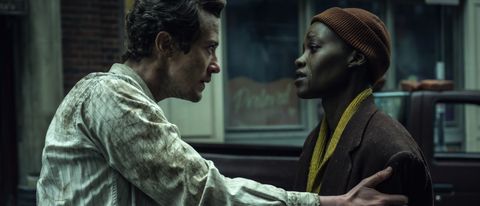When preparing to see the new installment of a film franchise for review, I always have an internal debate about whether or not I should revisit the previous movies so that they are fresh in my mind as the new story unfolds. In some cases, I decide to do it (just this week, I decided to rewatch both X and Pearl before screening and reviewing MaXXXine), but director Michael Sarnoski’s A Quiet Place: Day One is an instance where I opted to pass. I simply reasoned that the new feature is a prequel, and thus, it shouldn’t naturally be informed by events that transpire in the canon’s future.

Release Date: June 28, 2024
Directed By: Michael Sarnoski
Written By: Michael Sarnoski
Starring: Lupita Nyong'o, Joseph Quinn, Alex Wolff, and Djimon Hounsou
Rating: PG-13 for terror and violent content/bloody images.
Runtime: 100 minutes
In retrospect, this turned out to be a smart decision – but not for the reason I thought it would be: if I had A Quiet Place and A Quiet Place Part II fresh in my mind while watching A Quiet Place: Day One, I imagine I would have been even more bored and miserable recognizing that this franchise’s premise has truly been ridden into the ground.
The first sequel in this hit series was able to mostly get away with doing more of the same by essentially being an epilogue to the original, but the latest chapter has even less to contribute creatively and does so by doing the bare minimum when it comes to the characters. If there are still fresh ideas that can help build out this franchise, none of them are apparent here.
While John Krasinski isn’t back in the director’s chair for A Quiet Place: Day One, his finger prints remain with producer and “story by” credits – with the screenplay itself attributed to Michael Sarnoski (who directs the film as his follow up to the stellar 2021 drama Pig starring Nicolas Cage). Essentially expanding on the prologue from A Quiet Place Part II and moving the setting to New York City, the prequel explores the week or so when the world went to hell following the invasion of violent and sound-sensitive extraterrestrials (which somehow still don’t have a pop culture-friendly moniker after three movies).
Lupita Nyong’o stars as Samira – a poet dying from an advanced cancer who finds herself in Manhattan on the eponymous Day One when her hospice goes on a day trip to a marionette show. When the alien assault begins, many die, but those who live quickly understand that they must stay as quiet as possible in order to continue surviving. While the military does flybys in helicopters informing people to head to the South Street Seaport for transport to safety, the comfortably doomed Samira instead opts to head north to Harlem so that she can have a final slice at her favorite pizza place.
Being a prequel should not give A Quiet Place: Day One a pass to not further expand on the world of the franchise.
Prequels are always challenging given that they are telling a story that the audience vaguely already knows, but the best ones are successful because they find ways to change one’s perspective on the narratives that follow it in continuity. A Quiet Place: Day One opts for a different tactic: it opts not to do anything substantial, seemingly as to not disrupt the revelations that are made in the other two films. The first movie illustrated the alien’s sensitivity to high volume, high frequency sound; Part II introduced the idea that they don’t do well in water; and Day One… contributes absolutely nothing.
This lack of innovation is bad not just detrimental for the narrative, but it’s something that also infects the atmosphere. To put it bluntly, A Quiet Place: Day One isn’t scary in the slightest. There is no sequence equitable to the birth in the first movie or the suffocating safe in the second, as the film instead is content doing the exact same setup over and over and over again: things are quiet, there is a sudden loud noise, chaos erupts, and characters have to run for their lives and try and find a new haven. There’s obviously plenty of that in the movie’s two predecessors, and this one just puts that track on repeat. It takes no time at all to feel tired, and as much as you want it to, there is never a scene that comes along to significantly shake things up.
Lupita Nyong’o is terrific, but A Quiet Place: Day One has significant character issues it can’t overcome.
While Samira’s fatal diagnosis does have an impact on the stakes surrounding her character/ predictability of the film’s conclusion, it can be said that she proves to be a worthy protagonist – with great credit belonging to the tremendous charisma of Lupita Nyong’o. The protagonist’s realist perspective and acceptance of her fate provide her with a caustic attitude that has an “I don’t give a shit” charm, and her unique perspective on life allows for her greatest goal to be something as seemingly trivial as a good slice of New York pizza. She is inarguably the movie’s greatest strength (along with her sweet emotional support cat Frodo, who doesn’t cause nearly as much trouble as you think he might going into the movie)
The big drawback is that A Quiet Place: Day One doesn’t provide Samira with any opportunity to execute a proper arc, and adding surprisingly little to the mix is Joseph Quinn’s Eric – a stranger whom Samira meets during her journey uptown. We get to know Lupita Nyong’o’s character because she is introduced at a point in the film when characters can still talk and deliver significant exposition, but Eric is mostly an empty vessel after he is introduced in the second act, and we get to know almost nothing about him beyond that he is a law student and that his family lives in Kent, England. Quinn’s emotional performance allows the audience to empathize with him in his most terrified moments (he proves prone to panic attacks), but we’re never given the opportunity to connect with him in any deeper way.
In retrospect, there isn’t anything offered or answered for fans in A Quiet Place: Day One that isn’t featured in the aforementioned A Quiet Place Part II prologue – and that’s a comparison of a 100-minute feature with a 12-minute sequence. It’s a major disappointment on just about all levels, and pretty much kills any interest in future stories from this world.

Eric Eisenberg is the Assistant Managing Editor at CinemaBlend. After graduating Boston University and earning a bachelor’s degree in journalism, he took a part-time job as a staff writer for CinemaBlend, and after six months was offered the opportunity to move to Los Angeles and take on a newly created West Coast Editor position. Over a decade later, he's continuing to advance his interests and expertise. In addition to conducting filmmaker interviews and contributing to the news and feature content of the site, Eric also oversees the Movie Reviews section, writes the the weekend box office report (published Sundays), and is the site's resident Stephen King expert. He has two King-related columns.
Most Popular



